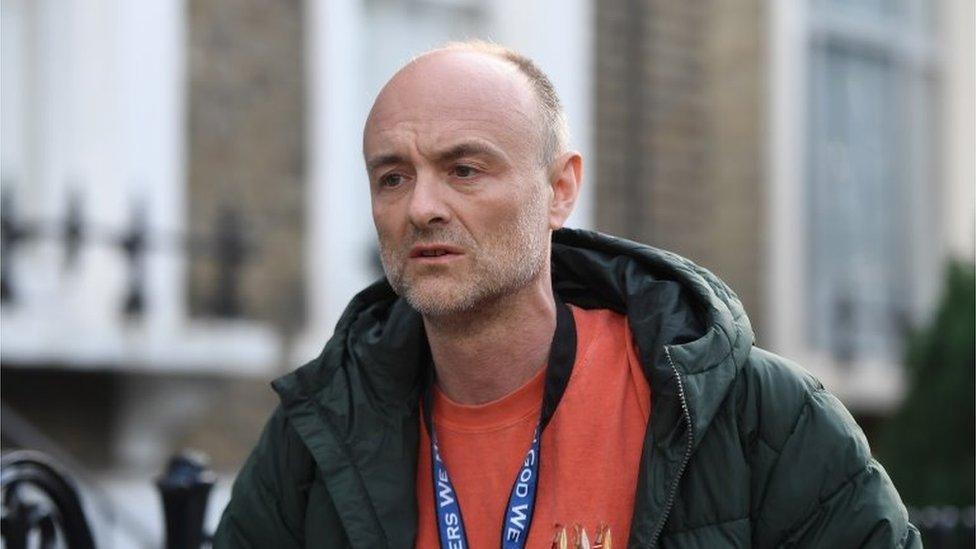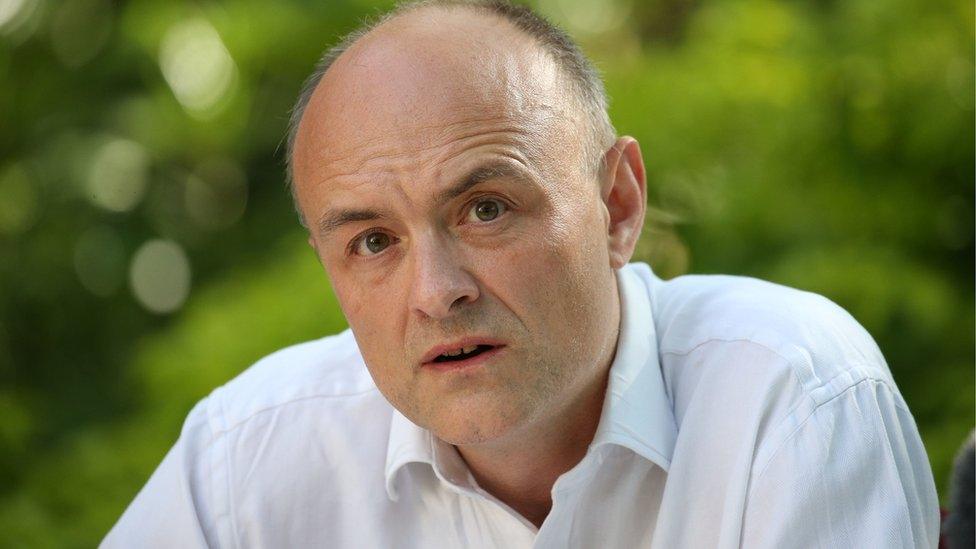Coronavirus: Why did Dominic Cummings say he predicted it?
- Published

Of the many details about travel plans, eye tests, and drives made at Dominic Cummings's Rose Garden press conference on Monday, one thing stood out to me that does matter, and will matter well beyond the future of one adviser.
One of the absolutely core issues in assessing the government's early performance in combating the pandemic, is whether it left it too late to impose the lockdown.
Scientists involved in pandemic planning have pinpointed a specific error - that it was too reliant on existing mathematic modelling of the pandemic based on influenza. They say it had not accounted for the fact that coronavirus was a different virus.
This had two principal vital differences.
Coronavirus is far more contagious than the influenza models, and, unlike flu, there are no approved existing vaccines or treatments.
This rendered the available pandemic stockpiles of treatments and pre-purchase of tens of millions of vaccines unusable. So only testing, tracing, or forms of social distancing and lockdown were going to work.
Dominic Cummings: "I believe that in all the circumstances, that I behaved reasonably and legally"
So for the PM's chief adviser to claim, in the middle of his defence, "only last year I wrote explicitly about the danger of coronaviruses" is worthy of some inspection. Such prescience would indeed have been impressive and helpful, and he does have a long-standing and well-known interest in mathematical modelling and big data.
Looking at his blog, there is one reference to coronavirus, and it was indeed in a blog written in March last year. But it wasn't quite as billed. It is a blog about the risk of a pandemic starting from a leak from a biological lab.
The point of it is that governments should pay money to "Red Teams" to try to break security at such institutions, including £1m to "honey trap" the security bosses.
If this is the writing that "explicitly" warned of the danger of coronaviruses, then it rather suggests that a key No 10 figure believes that biolab security is the relevant issue.
But then things get even stranger.
Mystery
The internet archive Wayback Machine, which tracks the changing versions of publicly available websites, shows that the blog was edited some time between 9 April and 3 May this year (after the pandemic started) to insert the reference to coronavirus and Chinese labs. This was first pointed out by a data scientist Jens Wiechers on social media, and can be seen here. , external
It is in the form of a new quote from an article, external already linked to in the Bulletin of Atomic Scientists. It was not in the original blog.
And the sitemap of Mr Cumming's blog corroborates this, showing that this post was indeed edited at 20:55:20 on the evening of 14 April this year, still available here., external This happens to be the day Mr Cummings returned to work from his Durham trip.
It is a mystery why he felt the need to burnish his credentials as a coronavirus sage so much that he pointed to having explicitly warned about something that was only added to his blog after the event.
There is no other reference to coronavirus or Sars or Mers on his blog. There is a page on the mathematics of pandemic modelling and "herd immunity" in a long essay written on the education system in 2013, but no references to coronaviruses.
It is difficult to see why editing a year-old personal blog would have been on any list of priorities for any No 10 official on a day like that - in the middle of the period where hospital deaths had peaked the previous week, but care home deaths were still mounting.
But Mr Cummings clearly felt the need on Monday to point to examples of prescience on this specific issue.
The context of his quote on coronavirus was to help disprove the allegation, first made in the Sunday Times, that he had backed a so-called "herd immunity" strategy.
I've asked No 10 for a response on the change to his blog, the reference to Chinese biolabs, and whether he stands by the idea he explicitly wrote about the dangers of coronaviruses.
A source acknowledged that the blog was updated and pointed to the fact that the original blog from last year linked to the separate article [in the Bulletin of Atomic Scientists] which did discuss coronaviruses.

A SIMPLE GUIDE: What are the symptoms?
RISK AT WORK: How exposed is your job?
HOW A VIRUS SPREADS: An explanation
RECOVERY: How long does it take to get better?

- Published25 May 2020

- Published25 May 2020

